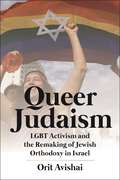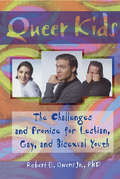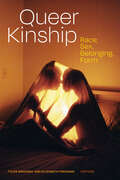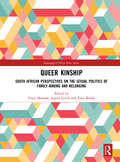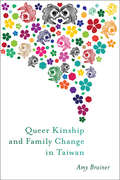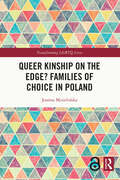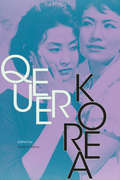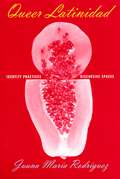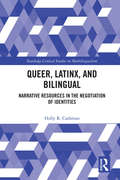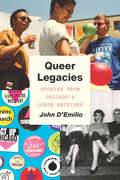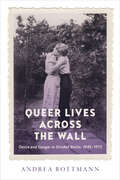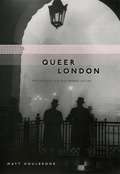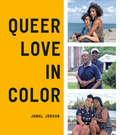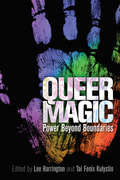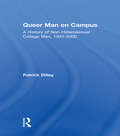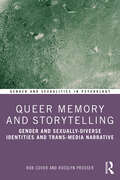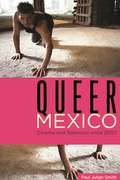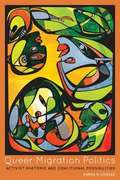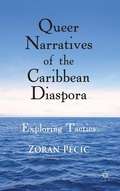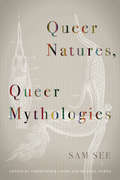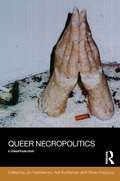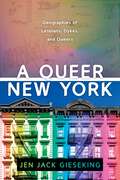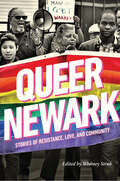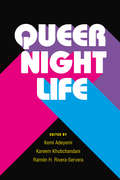- Table View
- List View
Queer Judaism: LGBT Activism and the Remaking of Jewish Orthodoxy in Israel
by Orit AvishaiOffers a compelling look at how Orthodox Jewish LGBT persons in Israel became more accepted in their communities.Until fairly recently, Orthodox people in Israel could not imagine embracing their LGBT sexual or gender identity and staying within the Orthodox fold. But within the span of about a decade and a half, Orthodox LGBT people have forged social circles and communities and become much more visible. This has been a remarkable shift in a relatively short time span. Queer Judaism offers the compelling story of how Jewish LGBT persons in Israel created an effective social movement.Drawing on more than 120 interviews, Orit Avishai illustrates how LGBT Jews accomplished this radical change. She makes the case that it has taken multiple approaches to achieve recognition within the community, ranging from political activism to more personal interactions with religious leaders and community members, to simply creating spaces to go about their everyday lives. Orthodox LGBT Jews have drawn from their lived experiences as well as Jewish traditions, symbols, and mythologies to build this movement, motivated to embrace their sexual identity not in spite of, but rather because of, their commitment to Jewish scripture, tradition, and way of life. Unique and timely, Queer Judaism challenges popular conceptions of how LGBT people interact and identify with conservative communities of faith.
Queer Kids: The Challenges and Promise for Lesbian, Gay, and Bisexual Youth
by Robert E OwensPacked to the hilt with living narratives, scholarly research, and problem-solution scenarios, Queer Kids: The Challenges and Promise for Lesbian, Gay, and Bisexual Youth examines the unique challenges faced by today’s homosexual young adults. You’ll learn what modern-day queer kids do to cope, survive, and find understanding in a world riddled with homophobic intolerance. Queer Kids is a lens of clarity that will help the average straight adult--and maybe even the average gay adult--see things from a kid’s point of view. Its detail-oriented, well-wrought chapters will provide you with literally hundreds of stories of young people who are trying to define themselves sexually and emotionally in a society of criss-crossing judgment, stereotyping, anger, and expectation. Aimed at three target groups--counselors, parents, and youth--this book introduces you to a variety of interesting kids, offers you a look at the process of coming out, and helps you grasp the experience of queer identification. Specifically, you’ll read about: queer kids and their families and peers the medical/health care profession’s impact on queer kids the teachers and counselors of gay, lesbian, and bisexual youth how to alleviate harrassment, abuse, withdrawal, and loneliness the effects of familial denial, prejudiced counselors, and standoffish gay adultsBeing a kid is tough--but being a queer kid can be even tougher. Fortunately, Queer Kids is available for students, ministers, teachers, youth- and health-care workers, and especially the friends and families of teens who are working through the personal turbulence that too often accompanies sexual and emotional definition. Guided by its upfront approach and practical resource list of written, computer, and telephone aids, you’ll see that a solution is not as distant as you think. Read it, and relearn what it means to be a kid again.
Queer Kinship: Race, Sex, Belonging, Form (Theory Q)
by Tyler BradwayThe contributors to this volume assert the importance of queer kinship to queer and trans theory and to kinship theory. In a contemporary moment marked by the rising tides of neoliberalism, fascism, xenophobia, and homo- and cis-nationalism, they approach kinship as both a horizon and a source of violence and possibility. The contributors challenge dominant theories of kinship that ignore the devastating impacts of chattel slavery, settler colonialism, and racialized nationalism on the bonds of Black and Indigenous people and people of color. Among other topics, they examine the “blood tie” as the legal marker of kin relations, the everyday experiences and memories of trans mothers and daughters in Istanbul, the outsourcing of reproductive labor in postcolonial India, kinship as a model of governance beyond the liberal state, and the intergenerational effects of the adoption of Indigenous children as a technology of settler colonialism. Queer Kinship pushes the methodological and theoretical underpinnings of queer theory forward while opening up new paths for studying kinship.Contributors. Aqdas Aftab, Leah Claire Allen, Tyler Bradway, Juliana Demartini Brito, Judith Butler, Dilara Çalışkan, Christopher Chamberlin, Aobo Dong, Brigitte Fielder, Elizabeth Freeman, John S. Garrison, Nat Hurley, Joseph M. Pierce, Mark Rifkin, Poulomi Saha, Kath Weston
Queer Kinship: South African Perspectives on the Sexual politics of Family-making and Belonging (Routledge/UNISA Press Series)
by Vasu Reddy Racy Morison Ingrid LynchWhat makes kinship queer? This collection from leading and emerging thinkers in gender and sexualities interrogates the politics of belonging, shining a light on the outcasts, rebels, and pioneers. Queer Kinship brings together an array of thought-provoking perspectives on what it means to love and be loved, to ‘do family’ and to belong in the South African context. The collection includes a number of different topic areas, disciplinary approaches, and theoretical lenses on familial relations, reproduction, and citizenship. The text amplifies the voices of those who are bending, breaking, and remaking the rules of being and belonging. Photo-essays and artworks offer moving glimpses into the new life worlds being created in and among the ‘normal’ and the mundane. Taken as a whole, this text offers a critical and intersectional perspective that addresses some important gaps in the scholarship on kinship and families. Queer Kinship makes an innovative contribution to international studies in kinship, gender, and sexualities. It will be a valuable resource to scholars, students, and activists working in these areas.
Queer Kinship and Family Change in Taiwan (Families in Focus)
by Amy BrainerInterweaving the narratives of multiple family members, including parents and siblings of her queer and trans informants, Amy Brainer analyzes the strategies that families use to navigate their internal differences. In Queer Kinship and Family Change in Taiwan, Brainer looks across generational cohorts for clues about how larger social, cultural, and political shifts have materialized in people’s everyday lives. Her findings bring light to new parenting and family discourses and enduring inequalities that shape the experiences of queer and heterosexual kin alike. Brainer’s research takes her from political marches and support group meetings to family dinner tables in cities and small towns across Taiwan. She speaks with parents and siblings who vary in whether and to what extent they have made peace with having a queer or transgender family member, and queer and trans people who vary in what they hope for and expect from their families of origin. Across these diverse life stories, Brainer uses a feminist materialist framework to illuminate struggles for personal and sexual autonomy in the intimate context of family and home.
Queer Kinship on the Edge? Families of Choice in Poland (Transforming LGBTQ Lives)
by Joanna MizielińskaQueer Kinship on the Edge? Families of Choice in Poland explores ways in which queer families from Central and Eastern Europe complicate the mainstream picture of queer kinship and families researched in the Anglo-American contexts. The book presents findings from under-represented localities as a starting point to query some of the expectations about queer kinship and to provide insights on the scale and nature of queer kinship in diverse geopolitical locations and the complexities of lived experiences of queer families. Drawing on a rich qualitative multi-method study to address the gap in queer kinship studies which tend to exclude Polish or wider Central and Eastern perspectives, it offers a multi-dimensional picture of ‘families of choice’ improving sensitivity towards differences in queer kinship studies. Through case studies and interviews with diverse members of queer families (i.e., queer parents, their children) and their families of origin (parents and siblings), the book looks at queer domesticity, practices of care, defining and displaying families, queer parenthood familial homophobia, and interpersonal relationships through the life course. This study is suitable for those interested in LGBT studies, sexuality studies, kinship and Eastern European studies.
Queer Korea (Perverse Modernities: A Series Edited by Jack Halberstam and Lisa Lowe)
by Todd A. HenrySince the end of the nineteenth century, the Korean people have faced successive waves of foreign domination, authoritarian regimes, forced dispersal, and divided development. Throughout these turbulent times, “queer” Koreans were ignored, minimized, and erased in narratives of their modern nation, East Asia, and the wider world. This interdisciplinary volume challenges such marginalization through critical analyses of non-normative sexuality and gender variance. Considering both personal and collective forces, contributors extend individualized notions of queer neoliberalism beyond those typically set in Western queer theory. Along the way, they recount a range of illuminating topics, from shamanic rituals during the colonial era and B-grade comedy films under Cold War dictatorship to toxic masculinity in today’s South Korean military and transgender confrontations with the resident registration system. More broadly, Queer Korea offers readers new ways of understanding the limits and possibilities of human liberation under exclusionary conditions of modernity in Asia and beyond.Contributors. Pei Jean Chen, John (Song Pae) Cho, Chung-kang Kim, Timothy Gitzen, Todd A. Henry, Merose Hwang, Ruin, Layoung Shin, Shin-ae Ha, John Whittier Treat
Queer Latinidad: Identity Practices, Discursive Spaces (Sexual Cultures #24)
by Juana María RodríguezAccording to the 2000 census, Latinos/as have become the largest ethnic minority group in the United States. Images of Latinos and Latinas in mainstream news and in popular culture suggest a Latin Explosion at center stage, yet the topic of queer identity in relation to Latino/a America remains under examined. Juana María Rodríguez attempts to rectify this dearth of scholarship in Queer Latinidad: Identity Practices, Discursive Spaces, by documenting the ways in which identities are transformed by encounters with language, the law, culture, and public policy. She identifies three key areas as the project's case studies: activism, primarily HIV prevention; immigration law; and cyberspace. In each, Rodríguez theorizes the ways queer Latino/a identities are enabled or constrained, melding several theoretical and methodological approaches to argue that these sites are complex and dynamic social fields.As she moves the reader from one disciplinary location to the other, Rodríguez reveals the seams of her own academic engagement with queer latinidad. This deftly crafted work represents a dynamic and innovative approach to the study of identity formation and representation, making a vital contribution to a new reformulation of gender and sexuality studies.
Queer, Latinx, and Bilingual: Narrative Resources in the Negotiation of Identities (Routledge Critical Studies in Multilingualism)
by Holly CashmanShortlisted for the 2018 BAAL Book Prize This book is a sociolinguistic ethnography of LGBT Mexicans/Latinxs in Phoenix, Arizona, a major metropolitan area in the U.S. Southwest. The main focus of the book is to examine participants’ conceptions of their ethnic and sexual identities and how identities influence (and are influenced by) language practices. This book explores the intersubjective construction and negotiation of identities among queer Mexicans/Latinxs, paying attention to how identities are co-constructed in the interview setting in coming out narratives and in narratives of silence. The book destabilizes the dominant narrative on language maintenance and shift in sociolinguistics, much of which relies on a (heterosexual) family-based model of intergenerational language transmission, by bringing those individuals often at the margin of the family (LGBTQ members) to the center of the analysis. It contributes to the queering of bilingualism and Spanish in the U.S., not only by including a previously unstudied subgroup (LGBTQ people), but also by providing a different lens through which to view the diverse language and identity practices of U.S. Mexicans/Latinxs. This book addresses this exclusion and makes a significant contribution to the study of bilingualism and multilingualism by bringing LGBTQ Latinas/os to the center of the analysis.
Queer Legacies: Stories from Chicago’s LGBTQ Archives
by John D'EmilioThe variety of LGBTQ life in Chicago is too abundant and too diverse to be contained in a single place. But since 1981, the Gerber/Hart Library and Archives has striven to do just that, amassing a wealth of records related to the city’s gay, lesbian, bisexual, transgender, and queer-identified people and organizations. In Queer Legacies, John D’Emilio—a pioneering scholar in the field—digs deep into Gerber/Hart’s collection to unearth a kaleidoscopic look at the communities built by generations of LGBTQ people. Excavated from one of the country’s most important, yet overlooked, LGBTQ archives, D’Emilio’s entertaining and enthusiastic essays range in focus from politics and culture to social life, academia, and religion. He gives readers an inclusive and personal look at fifty years of a national fight for visibility, recognition, and equality led by LGBTQ Americans who, quite literally, made history. In these troubled times, it will surely inspire a new generation of scholars and activists.
Queer Lives across the Wall: Desire and Danger in Divided Berlin, 1945–1970 (German and European Studies #50)
by Andrea RottmannQueer Lives across the Wall examines the everyday lives of queer Berliners between 1945 and 1970, tracing private and public queer life from the end of the Nazi regime through the gay and lesbian liberation movements of the 1970s. Andrea Rottmann explores how certain spaces – including homes, bars, streets, parks, and prisons – facilitated and restricted queer lives in the overwhelmingly conservative climate that characterized both German postwar states. With a theoretical toolkit informed by feminist, queer, and spatial theories, the book goes beyond previous histories that focus on state surveillance and the persecution of male homosexuality.
Queer London: Perils and Pleasures in the Sexual Metropolis, 1918–1957
by Matt HoulbrookIn August 1934, young Cyril L. wrote to his friend Billy about all the exciting men he had met, the swinging nightclubs he had visited, and the vibrant new life he had forged for himself in the big city. He wrote, "I have only been queer since I came to London about two years ago, before then I knew nothing about it." London, for Cyril, meant boundless opportunities to explore his newfound sexuality. But his freedom was limite: he was soon arrested, simply for being in a club frequented by queer men. Cyril's story is Matt Houlbrook's point of entry into the queer worlds of early twentieth-century London. Drawing on previously unknown sources, from police reports and newspaper exposés to personal letters, diaries, and the first queer guidebook ever written, Houlbrook here explores the relationship between queer sexualities and modern urban culture that we take for granted today. He revisits the diverse queer lives that took hold in London's parks and streets; its restaurants, pubs, and dancehalls; and its Turkish bathhouses and hotels—as well as attempts by municipal authorities to control and crack down on those worlds. He also describes how London shaped the culture and politics of queer life—and how London was in turn shaped by the lives of queer men. Ultimately, Houlbrook unveils the complex ways in which men made sense of their desires and who they were. In so doing, he mounts a sustained challenge to conventional understandings of the city as a place of sexual liberation and a unified queer culture. A history remarkable in its complexity yet intimate in its portraiture, Queer London is a landmark work that redefines queer urban life in England and beyond.“A ground-breaking work. While middle-class lives and writing have tended to compel the attention of most historians of homosexuality, Matt Houlbrook has looked more widely and found a rich seam of new evidence. It has allowed him to construct a complex, compelling account of interwar sexualities and to map a new, intimate geography of London.”—Matt Cook, The Times Higher Education Supplement Winner of History Today’s Book of the Year Award, 2006
Queer Love in Color
by Jamal JordanA photographic celebration of the love and relationships of queer people of color by a former New York Times multimedia journalist&“Thank you, Jamal Jordan, for showing the world what true love looks like.&”—Billy PorterQueer Love in Color features photographs and stories of couples and families across the United States and around the world. This singular, moving collection offers an intimate look at what it means to live at the intersections of queer and POC identities today, and honors an inclusive vision of love, affection, and family across the spectrum of gender, race, and age.
Queer Magic: Power Beyond Boundaries
by Lee Harrington Tai Fenix KulystinIn a wide variety of pagan paths, many forms of modern magic and mystery hold an expectation that all parties are heterosexual, cisgender, and, in many cases, white. In Queer Magic: Power Beyond Boundaries, Lee Harrington and Tai Fenix Kulystin bring together a diverse and passionate collection of authors and artists who break out beyond that belief and explore how being LGBT+ is not just acceptable when exploring magic, but powerful. Using the diverse tools of queer activism, education, and storytelling, through academic essays and first-person narratives to comics and poster-style art, this intersectional group exposes a world beyond what so many magical practitioners have presumed is "normal." The reality is that magic, whether in Wicca or Vodou, Heathenry or Polytheism, has been fueled by people and systems beyond the binary for millennia. For many within, magic and queerness are not separate, but deeply entwined pieces of identity, worldview, and culture experienced together, always. Drag queen magic, Inclusive witchcraft, and magic for healing and survival. Gender transition in Rome, possession practices, and DIY divination. Social justice, queer black tantra, and polarity beyond gender. Honoring ancestors, fluidity of consciousness, and reimagining the Great Rite. Queer sex magic, power sigils, deities that reflect diversity... and more. Whether you identify as lesbian, gay, bisexual, asexual, transgender, agender, genderqueer, or some other queer orientation, or you are curious about tools to access magic beyond what is often discussed, this book is for you. Each piece is a unique and passionate chance to look into your own relationship with magic, break out of the tales of what your practice "should" look like, and expand your awareness into the queer magic as well as your own power beyond boundaries.
Queer Man on Campus: A History of Non-Heterosexual College Men, 1945-2000
by Patrick DilleyThis book reveals the inadequacy of a unified "gay" identity in studying the lives of queer college men. Instead, seven types of identities are discernible in the lives of non-heterosexual college males, as the author shows.
Queer Memory and Storytelling: Gender and Sexually-Diverse Identities and Trans-Media Narrative (Gender and Sexualities in Psychology)
by Rob Cover Rosslyn ProsserQueer Memory and Storytelling unpacks the ways in which the narrative practices of recounting past experiences play a formative role in formation of identities, cultures, and social change among gender and sexually diverse individuals. Grounded in theoretical research, this work delves into historical accounts, case studies, and draws from the rich tapestry of interviews conducted during extensive LGBTQ+ research studies. It explores the power of memorial storytelling to shape the narratives surrounding gender and sexual diversity, offering profound insights into the role storytelling plays as a deeply subjective, personal, communal, and cultural form of expression. The book introduces a queer perspective that reframes the study of narrative psychology, community history, philosophies of subjectivity and the socio-cultural heritage of LGBTQ+ minority communities. It also focuses on the pivotal role played by memory and reflection found within online coming-up stories and contemporary modes of shared community memorialization. By employing queer theory, ethnographic research, interviews and meticulous media/textual analysis, the book presents new frameworks for comprehending the myriad facets of identity, and investigating what it means to remember and narrate selfhood in the context of social life, actively ‘queering’ the concept of memory. Queer Memory and Storytelling will appeal to academics, researchers and students in psychology, sociology, gender and sexuality studies, and communication.
Queer Memory and Storytelling: Gender and Sexually-Diverse Identities and Trans-Media Narrative (Gender and Sexualities in Psychology)
by Rob Cover Rosslyn ProsserQueer Memory and Storytelling unpacks the ways in which the narrative practices of recounting past experiences play a formative role in formation of identities, cultures, and social change among gender and sexually diverse individuals.Grounded in theoretical research, this work delves into historical accounts, case studies, and draws from the rich tapestry of interviews conducted during extensive LGBTQ+ research studies. It explores the power of memorial storytelling to shape the narratives surrounding gender and sexual diversity, offering profound insights into the role storytelling plays as a deeply subjective, personal, communal, and cultural form of expression. The book introduces a queer perspective that reframes the study of narrative psychology, community history, philosophies of subjectivity and the socio-cultural heritage of LGBTQ+ minority communities. It also focuses on the pivotal role played by memory and reflection found within online coming-up stories and contemporary modes of shared community memorialization. By employing queer theory, ethnographic research, interviews and meticulous media/textual analysis, the book presents new frameworks for comprehending the myriad facets of identity, and investigating what it means to remember and narrate selfhood in the context of social life, actively ‘queering’ the concept of memory.Queer Memory and Storytelling will appeal to academics, researchers and students in psychology, sociology, gender and sexuality studies, and communication.
Queer Mexico: Cinema and Television since 2000
by Paul Julian SmithQueer Mexico: Cinema and Television since 2000 provides critical analysis of both mainstream and independent audiovisual works, many of them little known, produced in Mexico since the turn of the twenty-first century. In the book, author Paul Julian Smith aims to tease out the symbiotic relationship between culture and queerness in Mexico. Smith begins with the year 2000 because of the political shift that happened within the government—the Institutional Revolutionary Party (PRI) was voted out of national office after over seventy years in power. Judicial and social changes for LGBT Mexicans came in the wake of what was known at the time as simply “the change” (“el cambio”) at the start of the millennium, bringing about an increased visibility and acknowledgment of the LGBT community. Divided into five chapters, Queer Mexico demonstrates the diversity of both representation and production processes in the Mexican film and television industry. It attempts also to reconstruct a queer cultural field for Mexico that incorporates multiple genres and techniques. The first chapter looks at LGBT festivals, porn production, and a web-distributed youth drama, claimed by its makers to be the first wholly gay series made in Mexico. The second chapter examines selected features and shorts by Mexico’s sole internationally distributed art house director, Julián Hernández. The third chapter explores the rising genre of documentary on transgender themes. The fourth chapter charts the growing trend of a gay, lesbian, or trans-focused mainstream cinema. The final chapter addresses the rich and diverse history of queer representation in Mexico’s dominant television genre and, arguably, national narrative: the telenovela. The book also includes an extensive interview with gay auteur Julián Hernández. The first book to come out of the Queer Screens series (a sub-series of the Contemporary Approaches to Film and Media series), Queer Mexico is a groundbreaking monograph for anyone interested in media or LGBT studies, especially as it relates to the culture of Latin America.
Queer Migration Politics: Activist Rhetoric and Coalitional Possibilities
by Karma R. ChavezDelineating an approach to activism at the intersection of queer rights, immigration rights, and social justice, Queer Migration Politics examines a series of "coalitional moments" in which contemporary activists discover and respond to the predominant rhetoric, imagery, and ideologies that signal a sense of national identity. Karma Chávez analyzes how activists use coalition to articulate the shared concerns of queer politics and migration politics, as both populations seek to imagine their ability to belong in various communities and spaces, their relationships to state and regional politics, and their relationships to other people whose lives might be very different from their own. Advocating a politics of the present and drawing from women of color and queer of color theory, this book contends that coalition enables a vital understanding of how queerness and immigration, citizenship and belonging, and inclusion and exclusion are linked. Queer Migration Politics offers activists, queer scholars, feminists, and immigration scholars productive tools for theorizing political efficacy.
Queer Narratives of the Caribbean Diaspora
by Zoran PecicThis book examines the concept of queer theory and combines it with the field of diaspora studies. By looking at the queer diasporic narratives in and from the Caribbean, it conducts an inquiry into the workings and underpinnings of both fields.
Queer Natures, Queer Mythologies
by Sam SeeQueer Natures, Queer Mythologies collects in two parts the scholarly work—both published and unpublished—that Sam See had completed as of his death in 2013.In Part I, in a thorough reading of Darwin, See argues that nature is constantly and aimlessly variable, and that nature itself might be considered queer. In Part II, See proposes that, understood as queer in this way, nature might be made the foundational myth for the building of queer communities.With essays by Scott Herring, Heather Love, and Wendy Moffat.
Queer Necropolitics: Queer Necropolitics (Social Justice)
by Adi Kuntsman Jin Haritaworn Silvia PosoccoThis book comes at a time when the intrinsic and self-evident value of queer rights and protections, from gay marriage to hate crimes, is increasingly put in question. It assembles writings that explore the new queer vitalities within their wider context of structural violence and neglect. Moving between diverse geopolitical contexts – the US and the UK, Guatemala and Palestine, the Philippines, Iran and Israel – the chapters in this volume interrogate claims to queerness in the face(s) of death, both spectacular and everyday. Queer Necropolitics mobilises the concept of ‘necropolitics’ in order to illuminate everyday death worlds, from more expected sites such as war, torture or imperial invasion to the mundane and normalised violence of racism and gender normativity, the market, and the prison-industrial complex. Contributors here interrogate the distinction between valuable and pathological lives by attending to the symbiotic co-constitution of queer subjects folded into life, and queerly abjected racialised populations marked for death. Drawing on diverse yet complementary methodologies, including textual and visual analysis, ethnography and historiography, the authors argue that the distinction between ‘war’ and ‘peace’ dissolves in the face of the banality of death in the zones of abandonment that regularly accompany contemporary democratic regimes. The book will appeal to activist scholars and students from various social sciences and humanities, particularly those across the fields of law, cultural and media studies, gender, sexuality and intersectionality studies, race, and conflict studies, as well as those studying nationalism, colonialism, prisons and war. It should be read by all those trying to make sense of the contradictions inherent in regimes of rights, citizenship and diversity.
A Queer New York: Geographies of Lesbians, Dykes, and Queers
by Jen Jack GiesekingThe first lesbian and queer historical geography of New York CityOver the past few decades, rapid gentrification in New York City has led to the disappearance of many lesbian and queer spaces, displacing some of the most marginalized members of the LGBTQ+ community. In A Queer New York, Jen Jack Gieseking highlights the historic significance of these spaces, mapping the political, economic, and geographic dispossession of an important, thriving community that once called certain New York neighborhoods home.Focusing on well-known neighborhoods like Greenwich Village, Park Slope, Bedford-Stuyvesant, and Crown Heights, Gieseking shows how lesbian and queer neighborhoods have folded under the capitalist influence of white, wealthy gentrifiers who have ultimately failed to make room for them. Nevertheless, they highlight the ways lesbian and queer communities have succeeded in carving out spaces—and lives—in a city that has consistently pushed its most vulnerable citizens away.Beautifully written, A Queer New York is an eye-opening account of how lesbians and queers have survived in the face of twenty-first century gentrification and urban development.
Queer Newark: Stories of Resistance, Love, and Community
by Yamil Avivi Jason Chernesky LeiLani Dowell Anna Lvovsky Queer Newark Oral History Project Mary Rizzo Christina Strasburger Dominique Rocker Peter Savastano Timothy Stewart-Winter Kristyn Scorsone Danielle M. Shields Carse Ramos Whitney StrubHistories of gay and lesbian urban life typically focus on major metropolitan areas like San Francisco and New York, opportunity-filled destinations for LGBTQ migrants from across the country. Yet there are many other queer communities in economically depressed cities with majority Black and Hispanic populations that receive far less attention. Though just a few miles from New York, Newark is one of these cities, and its queer histories have been neglected—until now. Queer Newark charts a history in which working-class people of color are the central actors and in which violence, poverty, and homophobia could never suppress joy, resistance, love, and desire. Drawing from rare archives that range from oral histories to vice squad reports, this collection’s authors uncover the sites and people of Newark’s queer past in bars, discos, ballrooms, and churches. Exploring the intersections of class, race, gender, and sexuality, they offer fresh perspectives on the HIV/AIDS epidemic, community relations with police, Latinx immigration, and gentrification, while considering how to best tell the rich and complex stories of queer urban life. Queer Newark reveals a new side of New Jersey’s largest city while rewriting the history of LGBTQ life in America.
Queer Nightlife (Triangulations: Lesbian/Gay/Queer Theater/Drama/Performance)
by Ramon Rivera-Servera Kareem Khubchandani Kemi AdeyemiThe mass shooting at a queer Latin Night in Orlando in July 2016 sparked a public conversation about access to pleasure and selfhood within conditions of colonization, violence, and negation. Queer Nightlife joins this conversation by centering queer and trans people of color who apprehend the risky medium of the night to explore, know, and stage their bodies, genders, and sexualities in the face of systemic and social negation. The book focuses on house parties, nightclubs, and bars that offer improvisatory conditions and possibilities for “stranger intimacies,” and that privilege music, dance, and sexual/gender expressions. Queer Nightlife extends the breadth of research on “everynight life” through twenty-five essays and interviews by leading scholars and artists. The book’s four sections move temporally from preparing for the night (how do DJs source their sounds, what does it take to travel there, who promotes nightlife, what do people wear?); to the socialities of nightclubs (how are social dance practices introduced and taught, how is the price for sex negotiated, what styles do people adopt to feel and present as desirable?); to the staging and spectacle of the night (how do drag artists confound and celebrate gender, how are spaces designed to create the sensation of spectacularity, whose bodies become a spectacle already?); and finally, how the night continues beyond the club and after sunrise (what kinds of intimacies and gestures remain, how do we go back to the club after Orlando?).
